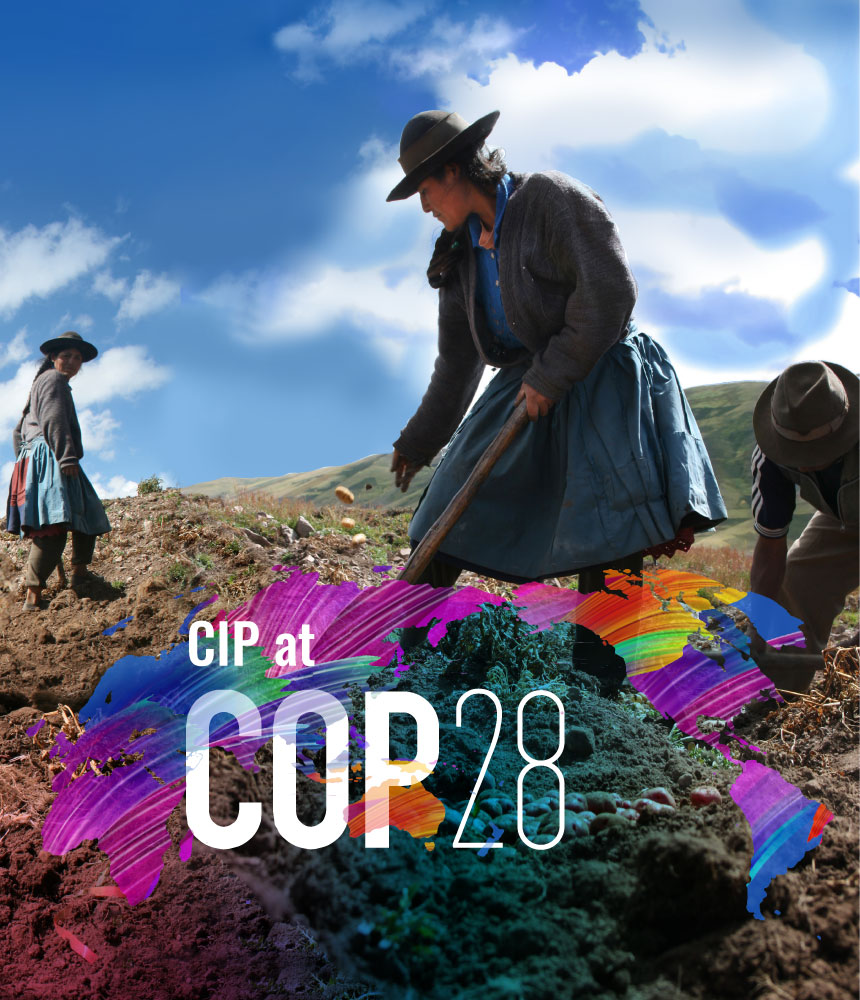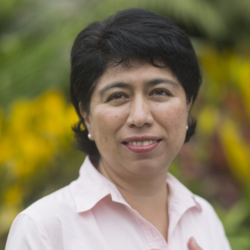Share to:

CIP at COP28
The International Potato Center (CIP) is poised to significantly impact the United Nations Climate Change Conference, COP28, scheduled in Dubai, UAE, from November 30 to December 12. Led by a distinguished delegation, including Drs. Simon Heck and Hugo Campos, CIP will emphasize the crucial role of root and tuber crops in rebuilding global food systems.
CIP’s objectives at COP28 range from showcasing the resilience of root and tuber crops to advocating for evidence-based policies and strengthening partnerships. The organization’s key messages address climate resilience, nutrition scaling, gender equality, crisis response, and agricultural adaptation. With a robust social media campaign using the hashtag #ClimateResilientRootsTubers, CIP aims to raise awareness and engage a diverse audience, highlighting its commitment to driving transformative change in global food systems. Stay tuned for updates on CIP’s impactful journey at COP28!
Tackling gender inequality for effective climate action in food systems
Women contribute to all aspects of agrifood systems from production to processing to procuring healthy foods for their families. As intensifying climate change threatens the sustainability of agrifood systems and the livelihoods of those that depend on them, women and other marginalized groups must play an active role in driving food system transformation through the uptake of climate innovations for adaptation and mitigation. This requires addressing persistent gender-related inequalities—including women’s more limited access to resources and services, fewer economic opportunities and discriminatory gender norms.
To tackle these challenges, the CGIAR and partners are launching an Agricultural Innovation Mission for Climate Innovation Sprint that leverages about USD $40 million in new investment over 4 years (2023-2027) to ensure that climate innovations in agrifood systems are designed with women’s needs, preferences, and aspirations in mind and to address underlying gender inequalities that prevent more widespread uptake of climate solutions by women in agrifood systems. The goal of this sprint is to strengthen the capacity of low-income countries to design policies and interventions with a gender and climate lens and work with national agricultural research systems to generate evidence on what works as gender-responsive climate solutions are rolled out. In this event, CGIAR and partners spotlight gender-responsive climate innovations, approaches for dissemination and metrics for measuring change related to empowerment and climate goals.
The sprint sets out to accomplish its goals through three interconnected focal areas:
- Testing climate innovations that tackle the twin challenges of climate change and gender inequality
- Creating an enabling environment for more widespread and equitable uptake of climate solutions
- Developing metrics to measure changes in gender inequality and progress towards climate adaptation and mitigation
How to join the event?
The livestream link will be shared in due time. If you are joining physically in Dubai, join us in SE Room 7.
Crop diversity for climate change adaptation and mitigation contributing to resilient and nature positive futures for farmers globally.
The event will show the power of crop genetic diversity to serve as a cost-effective strategy for enhancing climate resilience for food production globally across a range of species contributing to diversified diets.
Exploring roots and tubers, cereals, and legumes, including underutilized crops, experts from the global community of crop research and practitioners will highlight various benefits of within and across species diversity. The event will discuss how these crops could thrive in diverse environmental conditions, provide reliable sources of nutrition, and offer income stability in the face of climate change.
High-level speakers from research, funding agencies, farming communities and civil society will offer expertise and insights through opening remarks, fireside chats and panel discussions. The audience will be engaged through interactive Q&A opportunities.
Outcomes:
By the end of the event, attendees should clearly understand the potential socio-economic, nutritional and environmental advantages of conserving and using crop genetic diversity.

Simon Heck
Director General

Hugo Campos
Deputy Director General

Jorge Andrade-Piedra
Plant Pathologist Senior Scientist

Joyce Maru
Director Global Sweetpotato Agrifood Systems Program

Vivian Polar
Senior Scientist

